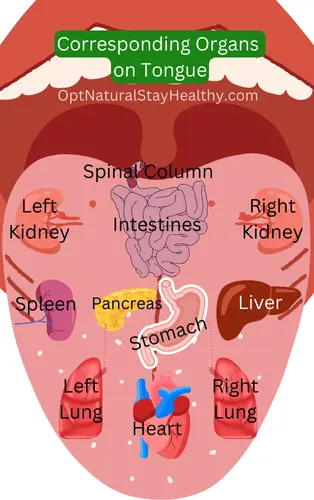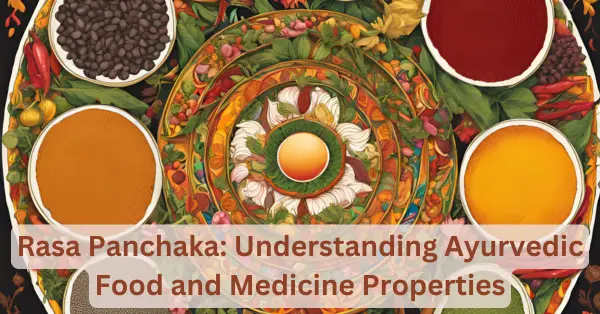According to Ayurveda, the tongue is a strong diagnostic tool. Read your tongue, and know your health.
The tongue is a detailed health map. A healthy tongue is pink in colour. The tongue shows a Dosha imbalance.
It is important to check your tongue regularly to know if your body is accumulating toxins. The tongue is a detailed health map, the same way as the face.
Jihwa pareeksha is a diagnostic tool that examines the tongue to assess health and disease conditions, with references found in ancient Indian and other global medical traditions.[1]
Tongue and Doshas in Ayurveda
The tip of the tongue shows kapha dosha, the middle part shows the pitta, and the root shows the vata imbalance. Excessive coating in any of these areas shows which dosha is aggravated.
In Ayurveda, Jihwa Pariksha (tongue diagnosis) is based on Dosha predominance and is considered essential for both diagnosis and prognosis of disease.[2]

1. Vata Tongue
It is the tongue with the vata imbalance.
Small, thin, and pale
It has cracks
The coating is Grey, Blackish, or brown. The coating will be in the last part of the tongue.
Vata imbalance Symptoms
- Anxiety
- Fear
- Gas
- Bloating
- Constipation
- Dryness, and
- Sleep issues.
2. Pitta Tongue
It is the tongue with pitta imbalance
Medium size and with a sharp tip
It is red.
The coating will be green, yellow, or orange.
The coating will be in the middle part of the tongue.
Pitta Imbalance Symptoms
- Inflammation
- Anger
- Irritation
- Hyper Acidity
- Headache and
- Skin Disorders
3. Kapha Tongue
Tongue with the Kapha imbalance
It is large, heavy and thick.
It is swollen and pale
The coating is whitish or mucous on the tip of the tongue.
Kapha Imbalance Symptoms
- Heaviness
- Congestion
- Lethargy
- Excessive Sleep
- Day Sleeping
- Slow digestion
- Easy weight gain
Other Tongue Signs in Ayurveda
Teeth imprints around the perimeter of the tongue.
This means malabsorption. This means your digestive system is weak. It is time to ignite your digestive fire.
Trembling Tongue
It is a sign of anxiety and fear. Mainly indicates vata disturbance. It is time to balance your vata.
Thick greyish coating
A thick, greyish coating on the tongue indicates the presence of toxins in the colon. Improper digestion of food can lead to the accumulation of toxins. Try avoiding oily, heavy, and spicy foods. Following a fruit-only diet for at least a day will help your body recover.
Multiple small cracks on the tongue
It indicates a strong chronic vata imbalance. It is your body telling you it’s time to take a vata-pacifying diet and lifestyle.
A pale tongue
It is a sign of low red blood cells, indicating possible anaemia. You may want to get yourself checked. The natural colour of the tongue is pink.
Anatomy of Tongue in Ayurveda
Different areas of the tongue correspond to the body’s various parts, as shown in the image below.

If the posterior part of the tongue is coated, toxins are present in the large intestine. When the middle part of the tongue is coated white, toxins are present in the stomach. If there is a yellowish coating on the tongue, it suggests there is a possible liver disorder.
The tongue is regarded as the mirror of the digestive system, and its examination helps in understanding both the healthy state and disease prognosis in Ayurveda.[3]
How to get rid of toxins accumulated on the tongue
- Periodic detoxification
- Organic foods and diet
- Use of a tongue scraper
Tongue Scraping Ayurveda
Charak Samhita in Ayurveda says that cleaning the tongue helps in removing the foul smell, and tastelessness, and eliminates toxins from the mouth.
Tongue scrapping is called the Jihwa Prakshalana or Jihwa Nirlekhana in Ayurveda. It’s a direct way of removing toxicity from your physiology.
Daily tongue scraping helps remove the toxic build-up which, if left untreated, causes bad breath and bacteria accumulation.
The coating can result from improper eating, poor digestion, and an imbalance of the gastrointestinal system.
Benefits of Tongue Scraping
- Clears toxins, bacteria, and dead cells.
- It prevents bad breath. Using a tongue scraper daily decreases the overall incidence of lactobacillus and streptococci bacteria in the mouth.
- Enhances the sense of taste
- You will better distinguish between bitter, sweet, salty, and sour foods. It can help one to enhance the flavour of the food.
- Promotes oral and digestive health
- Removing bacteria is the key to preventing cavities, gum disease, and other conditions in the mouth. Tongue cleaning balances the three doshas and helps in digestion.
How to do Tongue Scraping
- It would be best if you did it as the first thing in the morning.
- Use stainless steel or copper tongue cleaners.
- Tongue cleaners or scrapers should be curved and not sharp.
- You can also use a metal spoon.
- Gently scrape from back to front of tongue. Don’t scrap too hard. 7-14 strokes should be enough.
- Rinse the scraper in between.
- Follow tongue scraping with brushing, flossing, and a glass of warm water.
Conclusion
Ayurveda Tongue Analysis is a powerful tool for knowing the body’s condition. You can use it to understand the body’s needs and maintain optimal health. Small adjustments in your lifestyle and diet after the Ayurveda tongue diagnosis can prevent many serious ailments and diseases.
Reference
[1] Narahari SR, Ryan TJ, Aggithaya MG, Bose KS, Prasanna KS, Sushma KV, et al. Interrater reliability of diagnostic methods in traditional Indian Ayurvedic medicine. Evid Based Complement Alternat Med. 2013;2013:658391 [Internet]. 2013 [cited 2025 Jul 8]. Available from: Link to Study. <Go to Citation>
[2] Sharma R, Yadav N, Sharma S. Jivha Parikshan (Tongue Examination) – Ayurvedic and Modern Approach. World J Pharm Res. 2019;8(7):1607-1618 [Internet]. 2019 [cited 2025 Jul 8]. Available from: Link to Study. <Go to Citation>
[3] Kim J, Kim KH, Kim JW. A comparative study on the tongue diagnosis between Korean medicine and Ayurveda. J Korean Med. 2018;39(2):1-10 [Internet]. 2018 [cited 2025 Jul 8]. Available from: Link to Study. <Go to Citation>





